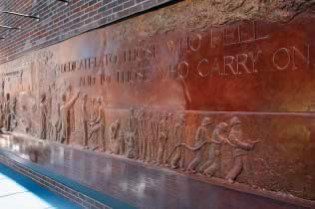SHARE:
State Budget
An Earful of Earmarks
Budget pork distorts priorities, costs billions, lures lobbyists -- and reaps constituents' gratitude.
 The only major memorial at ground zero |
From the $223 million for a "Bridge to Nowhere" in Alaska to Florida Congresswoman Katherine Harris' effort to get a $10-million Navy project for a guy who took her out for a $2,800 dinner, special appropriations known as "earmarks" or "member projects" have become the stuff of scandal and popular rebuke.
In the federal budget, billions of dollars of earmarks lurk in almost every corner. In Tallahassee, earmarks are often called "turkeys" and in past years have included the notorious chiropractor school and a medical school at Florida State University and other big projects like civic centers, often bearing the names of legislators or their relatives.
And in both capitals, the supposedly frugal Republicans now in charge are every bit as bad as Democrats were when they were in charge. The only difference in Florida, besides the number of zeroes in the dollars, is that governors veto a lot of the projects.
"It's not like we just woke up one morning and Santa Claus left us half a billion or a quarter-billion for these projects," says Dominic Calabro, longtime head of Florida TaxWatch. "It came at a cost. The cost was the integrity of the budget process. The cost was the equitable and fair distribution of hard-earned tax dollars."
Calabro says turkeys reflect political power more than priority needs. Tax- Watch produces a "turkey" list every year, and governors going back to Bob Graham have used it to veto individual projects. In Washington, the Committee Against Government Waste produces an elaborate "Pig Book," but it rarely changes anything.
So why do politicians dish out turkey? Because constituents love it. People hate other people's turkeys but cherish their own. And legislators view the size of their earmarks as a symbol of their power.
In January, Florida's Board of Governors, overseer of the State University System, praised Florida's four members of the House Appropriations Committee, especially Republican U.S. Rep. C.W. Bill Young of St. Petersburg, vice chairman and former chairman, for being "steadfast in making sure Florida's universities got their fair share" of research grants -- $90 million in earmarked federal money.
"Congress faced continuing costs for wars, hurricane relief and deficit reduction," Chancellor Mark Rosenberg said (without irony) in a news release, "and so the State University System faced huge obstacles in maintaining our edge in congressionally supported research."
"Earmarks get a bad rap," argues Board of Governors spokesman Bill Edmonds. "But they also fund some excellent, even outstanding, research projects."
More and more projects reflect special pleading from cities and counties and their growing bands of lobbyists. Congressional Quarterly (a sister publication of Florida Trend) reports that spending on lobbyists at the federal level by cities, counties and colleges grew from $10.7 million to $34.3 million between the end of 1998 and mid-2005. The St. Petersburg Times (another sister publication) reported recently that 43 Florida counties hired a total of 478 lobbyists for the 2006 legislative session in Tallahassee, quadruple the numbers from a decade ago, and 126 cities hired 322 lobbyists, about triple in a decade.
Alaska, however, needs no lobbyist in Washington. Its lone congressman, Republican Don Young (no relation to Florida's Young), chairs the House Transportation Committee. Its senior U.S. senator, Ted Stevens, chairs the Senate Appropriations Committee. Young's committee authorizes projects and programs. Stevens' controls the spending.
Don Young's committee last December finished a six-year, $286-billion authorization of transportation programs, funded largely by gasoline taxes. Nearly $1 billion went to Alaska.
"I stuffed it like a turkey," Young told constituents in Ketchikan (pop. 8,000), the site of one of two huge bridge projects Young funded at nearly a quarter-billion dollars apiece. (The other is at Anchorage.)
Don Young's largesse extends to Florida -- at least when there are contributors to be found. The Naples Daily News says he came down to Naples in February 2005 for a fund-raiser that produced $41,750 in contributions. Young's earmarks eventually included $10 million for an I-75 interchange near some of the contributors' land and developments on Coconut Road. The interchange wasn't on any local government's project list -- but is now because of the federal money.
The full legislation Young ramrodded had 6,137 earmarks and cost $30 billion more than President Bush set as the maximum to avoid a veto. But instead of vetoing it, Bush proudly traveled to a Caterpillar plant in Illinois to sign it because, he said, "there's going to be more demand for the machines you make here."























